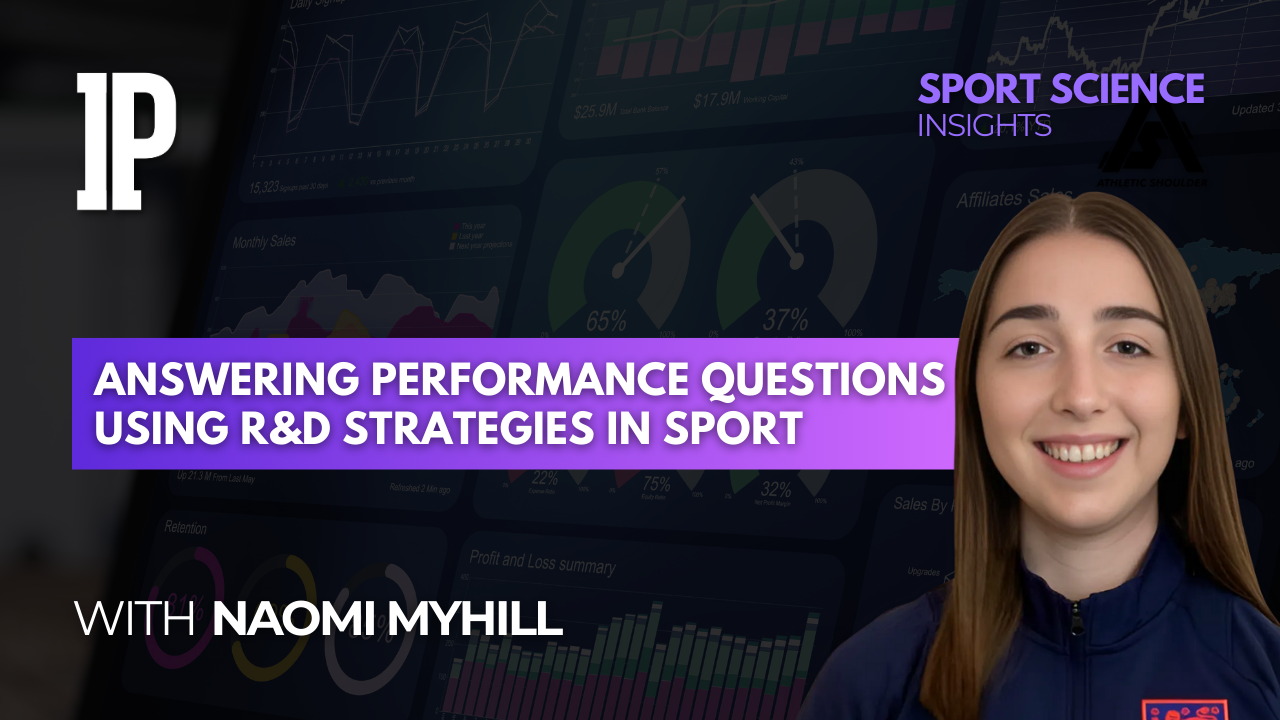Naomi Myhill: Answering Performance Questions Using R&D Strategies
Mar 04, 2025
Episode 176: Join host Steve Barrett on our Sports Science Insights podcast powered by Inform Performance, where cutting-edge research meets real-world application in elite sports. This episode features Naomi Myhill, a Sports Science & Research Consultant with a PhD in Sports Performance, specializing in the locomotor demands of women’s football. With extensive experience working with elite organizations such as The FA and City Football Group, Naomi shares evidence-based insights into the ever-evolving landscape of women's high-performance sport.
✏️ Key Topics Discussed:
▪️From Research to Performance – How performance questions shape research directions
▪️Women’s Football Insights – Training & match demands in English women’s domestic football
▪️Peak Intensities vs. Averages – Rethinking training prescriptions for female athletes
▪️ Volume vs. Intensity – Are players under-exposed to the game’s demands?
▪️Speed Thresholds in Women’s Football – Why aren’t they standardized yet?
▪️ Optimizing Performance Impact – Fast vs. methodological research approaches
▪️The Internal vs. External Load Conundrum – Managing female athlete workloads effectively
Key Take Aways
- Align Research with Organizational Strategy: Research projects should be strategically aligned with a club or organization's key performance objectives. This ensures that the findings are directly applicable and can be translated into actionable insights that improve on-field performance. Focusing research on areas that directly support the strategic goals increases the likelihood of adoption and impact.
- Avoid Data Collection Without a Clear Purpose: Organizations often collect vast amounts of data, but this can lead to wasted resources if the data is not tied to specific performance questions. Before initiating any data collection, clearly define the performance question that needs to be answered. This ensures that the data collected is relevant and contributes to solving a specific problem.
- Address Broad and Specific Performance Questions: Performance questions can range from broad, league-wide inquiries, such as optimizing physical performance across different clubs, to more specific, club-level objectives, such as reducing the incidence of ACL injuries within the academy. Tailoring research questions to the specific needs and context of the organization is crucial for generating meaningful and actionable results.
- Standardize Data Collection Technology for Multi-Club Studies: When conducting research across multiple clubs or organizations, it is essential to use the same technology for data collection. Different systems have inherent measurement errors, making it difficult to accurately compare data across clubs. Using a standardized technology ensures consistency and allows for more reliable comparisons and generalizable findings.
- Adapt Research Plans to Overcome Challenges: Unexpected events, such as the COVID-19 pandemic, can disrupt research projects. Researchers must be prepared to pivot and adapt their original plans while still addressing the core performance problem. Flexibility and adaptability are essential for navigating unforeseen challenges and ensuring the successful completion of research projects.
- Leverage Foot-Mounted IMUs for Locomotor Data: The use of foot-mounted inertial measurement units (IMUs) to collect locomotor data represents a significant advancement in women's football research. This technology provides a wealth of data on player movement patterns, which can be used to optimize training programs, reduce injury risk, and improve on-field performance. The ability to collect detailed locomotor data across multiple clubs offers valuable insights into the demands of the game.
- Develop Programming Skills for Data Analysis: Sports scientists and researchers should receive training in programming languages like R to efficiently handle large datasets and perform advanced statistical analyses. Programming skills enable researchers to automate data processing, perform complex analyses, and generate visualizations that provide valuable insights into player performance.
- Automate Tasks and Enhance Statistical Analysis with Programming: Learning programming languages can save significant time by automating repetitive tasks and providing more flexibility in statistical analysis compared to traditional software like SPSS. Programming allows researchers to customize their analyses, explore data in more detail, and generate more meaningful insights.
- Meet the Growing Demand for Sports Scientists with Programming Expertise: The demand for sports scientists with programming skills is increasing, as evidenced by the growing number of job descriptions requiring proficiency in languages like R or Python. Developing programming skills enhances career prospects and enables sports scientists to contribute more effectively to data-driven decision-making in sports organizations.
- Improve the Game Through Multi-Club Research: A multi-club project can improve the general state of the game by providing valuable insights into optimizing physical performance and player development across different competitive levels. By sharing data and best practices, clubs can collectively raise the standard of play and create a more competitive and sustainable environment for athletes.
Where you can find Naomi:
• X/Twitter
• ResearchGate
-
Sponsors
VALD: makers of the Nordbord, Forceframe, ForeDecks and HumanTrak. VALD Performance systems are built with the high-performance practitioner in mind, translating traditionally lab-based technologies into engaging, quick, easy-to-use tools for daily testing, monitoring and training.
Hytro: The world’s leading Blood Flow Restriction (BFR) wearable, designed to accelerate recovery and maximise athletic potential using Hytro BFR for Professional Sport.
Teambuildr: A platform for any coach in any setting. Every day, thousands of coaches log into TeamBuildr to write training programs, build questionnaires and access athlete and client performance data. Teambuildr is a complete platform. Whether you're building your own programming, looking to create custom reports or give athletes a tool for accountability, they've built it out.




